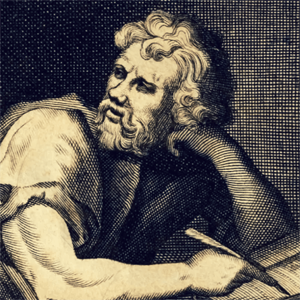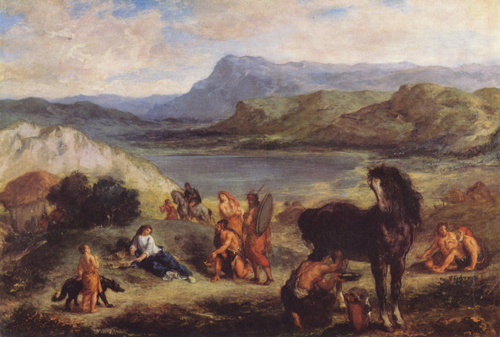
Your complimentary articles
You’ve read one of your four complimentary articles for this month.
You can read four articles free per month. To have complete access to the thousands of philosophy articles on this site, please
Articles
The Stoic’s Lacuna
Alex Richardson explores the ethical cavern at the centre of Stoicism.
“What is up to me, what is not up to me?” – Epictetus
“You can’t control the weather, you can’t control other people, you can’t control the society around you” – Dr Michael Sugrue
There is a fault line running through Stoic philosophy. This faultline was present in its ancient Greek and Roman origins, but in the modern world it has become pronounced. The faultline is that, despite the protestations of its founders and some of its advocates today, Stoicism can lead to political quietism – a withdrawal from the sphere of political life, and public life more generally, exclusively into the realm of the individual and personal. My argument is that this tendency towards quietism is a foundational flaw in Stoicism which co-exists uneasily with much more powerful and useful Stoic meditations on self-mastery as a prerequisite of virtuous intervention in the world.
Before we examine this issue, it is worth mentioning a caveat. Since it was not designed with doctrinal coherence in mind, it is no denigration of Stoicism to observe that, taken as a whole, it is sometimes self-contradictory. As a tradition which is fundamentally eclectic and epigrammatic rather than a systematised philosophy, Stoicism is perhaps more like the Upanishads, the Bible, or perhaps like horoscopes: an alphabet soup of ideas from which we can draw numerous, sometimes divergent, conclusions. At one moment Stoicism appears to promote vigorous action in support of natural justice, at another time, Zen-like passivity. As such, there are permanent problems with describing Stoicism as a myopically apolitical worldview: it is easy to find quotations to the contrary, and one can cite the deliberate action in the political sphere of its best-known names: Epictetus the philosopher, Seneca the orator, and the Stoic Roman Emperor Marcus Aurelius. And these most famous Stoics were not the only ones who pursued a great deal of action in public life. Virtually all did. But this is not an impediment for my argument, for reasons I’ll mention later.
Becoming Silent
Marcus Aurelius is perhaps the best-loved of the Stoics, with his Meditations (c.180 AD) often promoted as a manual for daily living. In the Meditations, Aurelius returns again and again to a comprehensive fatalism, which asks us to “Love and desire that alone which happens to you, and is destined by providence for you; for, what can be more suitable?”
This position flowed from Stoic metaphysics: they saw nature as ordered through a Logos or divine organising principle, so why not accept what’s divinely logically ordered for you? But Aurelius at times goes further, to single out ambitious political goals as foolish:
“How very little worth, too, are those poor creatures who pretend to understand affairs of state, and imagine they unite in themselves the statesman and the philosopher! Mere froth! Do you, O man, that which nature requires of you, whatever it be. Set about it, if you have the means… and don’t hope for Plato’s commonwealth.”
Where does this tendency towards quietism come from?
To answer this question, it’s useful to situate the ideas within their concrete social context. In this case I follow the analysis of Ellen Meiksins Wood in Citizens to Lords (2008):
“as polis gave way to empire, the main arena of philosophical reflection shifted. The sphere of civic action and deliberation receded, bringing into focus the private individual… While there was certainly a place in Stoicism, especially in its later Roman form, for civic duty and political activism, [they] located human happiness not in the polis but in the individual’s inner resources”
Stoicism developed, then, in the social context of the decline of the polis (Greek city-state) and therefore a decline in engagement in the political sphere. In this context, a philosophy which centred on ‘the individual’s inner resources’ to the practical exclusion of all else was likely to gain popularity, since the individual’s inner resources appeared to be the only show left in town. While the polis had provided a viable arena to influence the world, its being swallowed up in grander political machinations left the monolithic Roman Empire as the practical political unit, which was too vast for most civic action to meaningfully affect. A philosophy in accordance with this new world, such as Stoicism, seemed to align with the way the wind was blowing, and therefore appeared highly relevant, perhaps even consolatory.
How does this same idea percolate through to the world today?

Epictetus questioning
Ryan Holiday is a popular contemporary author on Stoicism who pleads strongly for its compatibility with progressive politics. He claims the view of Stoicism as recommending resigned acquiescence to injustice is a mistake, and provides quotations and explanations to back up his argument. But as I’ve said, Stoicism is frequently self-contradictory: for every line the Stoics gave us which seems to motivate action, it is quite possible to horse-trade a quote which points towards a maddeningly beatific passivity. Consider Epictetus: “Seek not that the things which happen should happen as you wish but wish the things which happen to be as they are, and you will have a tranquil flow of life” (Enchiridon). In other words, learn to like whatever is the case and stop wanting it to be otherwise.
Holiday wants to get as far away as he can from this understanding of Stoicism; and understandably so, since it amounts to an abdication of the moral responsibility to combat unnecessary suffering. There is a sense of wanting to both have his cake and eat it here, as the Stoic both attempts to transcend the world through total indifference and counsels us to improve the world through our choices and actions. Here is Seneca, arguing for both passivity and action within the same passage: “The true felicity of life is to be free from perturbations; to understand our duties toward God and man; to enjoy the present without any anxious dependence upon the future” (Letters from a Stoic). Holiday might argue though that this is in fact coherent; that Seneca is merely telling us to take emotion out of our response; to be satisfied with what we have, but to work for social improvement nonetheless. But even this makes little sense. If it’s rational to be indifferent to outcomes, on what basis would one work for one outcome over another?
However, very few people have read or practiced Stoic philosophy as a form of nihilism, in which you don’t care one way or the other how the future unfolds. Rather, as I mentioned, all the major Stoic thinkers acted for what they saw as the public good in political life, and did not simply give up on it. Yet this probably owes more to the palpable inhumanity of taking a nihilistic position than it does to Stoicism implying an inclination towards intervention. Like the radical scepticism of David Hume, nihilism is not something that could really be lived day-to-day. In Hume’s words, a man is compelled to “amidst all their philosophy, be still a man.” Perhaps this is also what happens to Stoicism when considering its own recommendation of Zen-like acquiescence.
Yet despite what Holiday argues, even at the level of pure textual exegesis there is no escaping the reality that multiple Stoic authors at one time or another promoted utter acceptance of the world as it stood, and regarded attaining this attitude as the pinnacle of self-mastery. Holiday’s most convincing arguments are concrete and historical – he points out the Haitian revolutionary Toussaint L’Overture’s admiration for Epictetus [see last Issue, Ed], or the adoption of Stoicism by the painter Eugene Delacroix. But this only reinforces the argument that Stoic thought operates with the pick-and-interpret quality of most ideologies. Depending on historical context, different ideas can be drawn from it for the purposes of the moment. And in Ancient Greece and Rome, the decline of the polis led to an fixation with what the private individual could do in their personal life at the cost of what could be achieved collectively in the public realm.

Ovid Amongst The Scythians by Eugene Delacroix, 1859
Modern Stoicism
Let’s now look at how Stoicism is operating today. In today’s world an analogous process to the decline of the polis and its requirement for political engagement has been taking place for many decades. Neoliberal thinking has meant a huge shift away from collective identity and public life, towards the private efforts of individuals within markets. Accordingly, we would expect to see a renewed emphasis on what the individual can do in isolation.
One of the pre-eminent examples of individualist thought in popular discourse today is Jordan Peterson’s decree that we should ‘Set our house in order before trying to change the world’. It’s possible to read this as Peterson saying that we should first take care of our lives, then attend to the social world through politics; but in fact his proposition is a more radical one. As he argues, it becomes evident that Peterson believes that an ideal politics would probably be an emergent result of the mass take-up of personal responsibility. Epictetus might agree: “Thou wouldst do good unto men? Then show them by thine own example what kind of men philosophy can make, and cease from foolish trifling.” In Peterson’s view, a world of people setting their house in order would tackle many socio-political problems, and the problems that remain are considered natural and immutable. This includes economic inequality, which Peterson believes is the result of the law of distribution known as the Pareto Principle: “For to everyone who has will more be given, and he will have abundance; but from him who has not, even what he has will be taken away.” (The Bible) In other words, wealth and power naturally accumulate in the hands of a few exceptional individuals at the top.
Dr Michael Sugrue puts this same point forward with admirable honesty and bluntness in a popular lecture on Aurelius. He claims that Stoicism teaches us that the social structure is ‘not our problem’, and that “if God, or nature, or whatever is controlling the world makes you a slave, then be a good slave.” Again, Epictetus counsels the same acceptance of the social order, asking us to “Remember, therefore, that whenever you suppose those things that are by nature slavish to be free… you will be hindered, miserable and distressed, and you will find fault with both gods and men.”
Peterson’s thought dovetails with the Stoic view that there is an underlying natural structure to the world, and in human life in particular. This idea is easily appropriated to political conservatism, and it appears as a conservative leitmotif in many historical periods. But the pertinent point is that the political sphere is a largely arid terrain for human effort because it is circumscribed so tightly by rules we don’t have the power to affect. Since attempting to subvert those natural rules can only end in failure or disaster, it is better not to try, and instead to turn our attention to improvement in our personal lives.
In various forms the ‘set your own house in order first’ (or in Peterson’s phrase, ‘tidy your bedroom’) principle has become enormously popular, and is used regularly by the right as a cudgel with which to beat the young and politically active. One of its passionate advocates is Katherine Birbalsingh, ‘Britain’s strictest headmistress’, who has an interesting take on social justice. Her basic perspective is that social inequality exists, is serious, and is wrong: “Of course the world is run by an old boys network, and of course it’s not fair,” she says. Where she differs from the left is that she discourages wasting energy on trying to change this state of affairs. “Do what’s in your means!” she cried in one speech at a meeting of teachers, exhorting the members of my profession to focus on addressing inequality at the micro-level, where we can have real impact, instead of daydreaming about systemic change. This is how I think the Stoic’s political paradox is being answered today: not with an utter acquiescence to injustice – which is rare – but with a radical shrinking of the scope of what can be attempted. It’s as though a dragon has arrived to terrorise the village, and Birbalsingh recommends that, rather than banding together to kill it, everyone acts within their means to make their homes fire-resistant.

Modern Stoics? Peterson, Birbalsingh and Willink by Gail Campbell, 2021
Since the onset of neoliberalism from the Eighties onwards, the whole idea of collective action has steadily eroded in the public mind. Accordingly, collective action has vanished from the gamut of viable interpretations of Stoicism, to the point where it is attacked in principle, as a sort of adolescent shirking of gritty hard work and the day-to-day grind to improve things. But it’s not the fault of collective action as a category, it’s a myopia encouraged by the specific historic circumstances in which we find ourselves, where palpable victories from collective action appear so thin on the ground. If one type of activity doesn’t seem to be bearing fruit (unless you take the historically zoomed-out view), it would indeed seem sensible to jettison it in favour of the kind of ‘sweat-of-thy-brow’ striving Birbalsingh holds in high esteem. But how bizarre such a view would have looked during, say, the 1960s, as the Civil Rights Movement chalked up victory after victory through mass unity in the communities and the streets. How misread Epictetus’ and other Stoics’ positions would have seemed; and how impoverished and feeble this conception of what is within our power to affect.
Another popular figure embracing a politically conservative vision of Stoicism is the former Navy SEAL Jocko Willink, who produces a podcast on the theme of ‘extreme ownership’ – that is, taking as much personal responsibility as possible. One of Willink’s most viewed videos is a speech where he exhorts his viewers to respond to misfortune with the mantra “GOOD!” Anything that befalls a person can in some sense be seen as an opportunity.
Unlike classical Stoicism, Willink follows the focus on the private individual to its logical extreme when it comes to politics. Asked why he doesn’t comment on current affairs, he responded that it fundamentally doesn’t matter – that most people are concerned with their lives, their businesses, paying off their mortgages, and so on, and like Birbalsingh, he doesn’t believe that any of those issues are best addressed in the collective sphere. The idea that peoples’ ability to pay off their mortgages might be influenced by the political management of the economy, and that it’s something in our collective power to affect, rather than something we are simply confronted with, like the weather, is nowhere in his worldview. His Stoicism is one that has shrunk down radically to the level of the private individual.
This is echoed in another figure modern Stoics hold in high esteem, the entrepreneur Gary Vaynerchuk. Vaynerchuk, in a recent speech, follows Willink in trying to blot out the wider world as an arena worth considering: “The second you actually genuinely stop blaming anything, and the second you start taking on 100% accountability is the second you start getting happy”.
Birbalsingh, Willink, Peterson, and their co-thinkers are entirely correct in their view that one must attend to reality as it is rather than as we wish it to be, and face the limitations of all human endeavour squarely. Where their version of Stoicism falters is in the unwritten implication they have taken from this, which is that the space for deliberate and successful intervention in social affairs is so severely cramped that we are better off just doing what we can in our personal lives. At the extreme, this version of Stoicism would have us literally resign ourselves to existential threats facing the globe, climate change being the key current example, a good instance of this attitude being Roy Scranton’s Learning To Die In The Anthropocene (2015). Here Scranton argues that the best course of action for humans in the face of climate change is to accept it, and thereby die with dignity. But this sort of view is as unrealistic as perspective of the teenage utopian who believes money could be abolished tomorrow. While the utopians need to put their feet on the ground, the Stoics must lift their heads and widen their view to include collective action, which makes possible what isolated individuals could never achieve.
© Alex Richardson 2021
Alex Richardson is a History teacher in Croydon.









